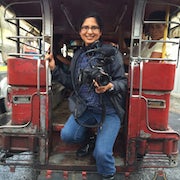 Sonia Narang takes her audience deep into the Navajo Nation where water is scarce and drought conditions are severe. Her viewers experience real-life climate change impacts through the eyes of a Navajo grandmother carefully herding sheep on her drought-stricken farm. Narang’s 360 video camera brings her audience even closer to her subject, creating a sense of intimacy, through a reporting technique known as immersive storytelling.
Sonia Narang takes her audience deep into the Navajo Nation where water is scarce and drought conditions are severe. Her viewers experience real-life climate change impacts through the eyes of a Navajo grandmother carefully herding sheep on her drought-stricken farm. Narang’s 360 video camera brings her audience even closer to her subject, creating a sense of intimacy, through a reporting technique known as immersive storytelling.
“I want my audience to understand what it’s like to be in the position of a Navajo woman in a rural homestead in northern Arizona,” says Narang, an award-winning multimedia journalist and alumna of Metcalf Institute’s 2015 Annual Science Immersion Workshop for Journalists. “This kind of footage allows you to see what’s going on from the subject’s perspective. You can see the extent to which the extreme drought is affecting her life.”
She had the honor of presenting her story at the 2018 Global Editors Network Summit in Lisbon, Portugal in a session entitled, Immersive Journalism Meets Climate Change.
Narang, who earned a master’s degree in documentary filmmaking from UC Berkeley, has reported and produced stories around the globe on a range of issues including climate change and the environment, global health, and gender equality for PRI’s The World, the BBC, NPR, PBS NewsHour, The New York Times, NBC, and other news outlets.
Over the past two years, her reporting has focused on the effects of climate change on women – a segment of the population disproportionately impacted by natural disasters, droughts, floods, and damage to agriculture. “Especially in developing countries, it’s because women are usually the caretakers, raising children, and growing food for the family,” she explains.
Narang’s reports from Fiji, a Pacific island nation hit hard by a powerful cyclone in 2016, highlight women taking the lead in climate resiliency and solutions. “Women are learning how to plant differently, diversifying their seeds, and essentially determining their climate future on their own,” says Narang. “I met a group of women who started their own co-op banking system so that they could save money and be better prepared for when the next climate change disaster hits.”
In September of 2018, Narang reported on a rural Japanese town of about 2000 people committed to battling climate change by reducing the town’s waste down to zero. The ambitious initiative, headed by a woman, has attracted international attention as visitors flock to the town’s Zero Waste Academy to attend workshops. The story has also had a lasting impact on Narang. “I started thinking more about what I throw away, and how to re-use things more.”
Narang reaches back to her Metcalf fellowship training as she covers environmental issues such as coastal erosion and city planning around the globe. “It’s interesting how learning about coastal adaptation in Rhode Island translates to reporting about climate resilience on a small Island in the Pacific or the Navajo Nation,” she says. “It made me a lot clearer about how to report on sustainability and how people are adapting to climate change.”
As for future reporting projects, Narang would like to dive deeper into the art of immersive storytelling using data and compelling character stories to explore the intersection of climate change and gender.
Read More Alumni Profiles